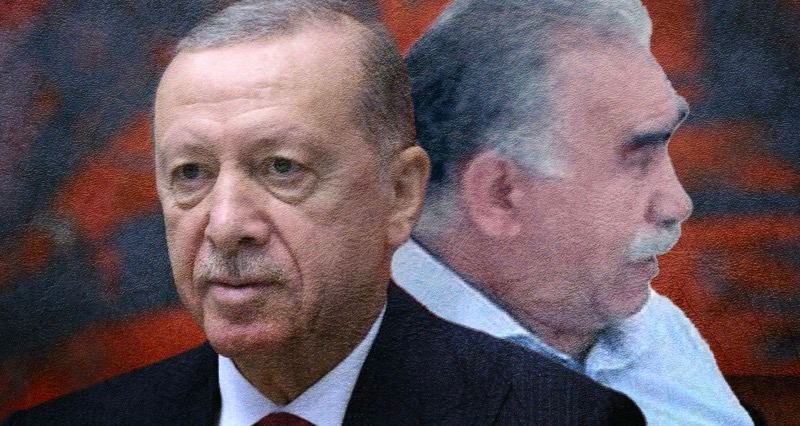Turkish politics is once again undergoing an upheaval.
It all began when Devlet Bahçeli, the leader of the Nationalist Movement Party (MHP), the largest nationalist party in the country and the coalition partner of the ruling government, proposed that Abdullah Öcalan, the imprisoned leader of the PKK terrorist organization, be allowed to address Parliament to call on the PKK to lay down their arms.
Government circles explained that Bahçeli aims to unite Türkiye and Kurdish populations in the region against the US and Israeli-backed plans targeting Türkiye.
The link between the “democratic initiative” and Syria
President Recep Tayyip Erdoğan, the Justice and Development Party (AKP), and not surprisingly the main opposition Republican People’s Party (CHP), whose leadership leans liberal, all voiced support for Bahçeli’s proposal.
As Türkiye embarked on the “Second Democratic Initiative Process” (the first, initiated by the AKP between 2013 and 2015, had failed) major developments unfolded in Syria. Opposition groups backed by Türkiye captured Damascus after a rapid advance, the details of which still remain unclear, and toppled Bashar al-Assad’s regime after 13 years of civil war.
The news from Syria brought high joy to the AKP government, which has been grappling with a worsening economic crisis. Turkish intelligence chief İbrahim Kalın and Foreign Minister Hakan Fidan went to Damascus to congratulate the new administration.
Almost simultaneously, a delegation from the PKK-affiliated Peoples’ Equality and Democracy Party (DEM Party) visited Abdullah Öcalan in İmralı Prison with state approval. Öcalan stated that he will contribute to Erdoğan and Bahçeli’s plan.
Meanwhile, nationalist and Kemalist parties, including the Good Party, the Victory Party and the Vatan Party, launched protests against the new initiative.
And Victory Party leader Ümit Özdağ, was arrested on charges of “inciting hatred and hostility” due to his anti-Syrian migrant posts on social media.
Istanbul Mayor Ekrem Imamoğlu, who supported the “new democratic initiative” and the government’s Syria policies, faced a criminal investigation for his remarks targeting a prosecutor handling a case against the CHP’s youth wing. Imamoğlu had also expressed willingness to visit Damascus to “share his experiences” after Assad’s fall, but his offer was declined by Syria’s new government.
The combination of initiatives, visits, investigations and arrests has rendered the already turbulent Turkish politics even more so.
The government’s plan
A closer look reveals that Erdoğan and Bahçeli’s “new initiative process”, ostensibly to counter “US and Israeli plans against Türkiye”, is tied to developments in Syria. The government’s objectives appear to be:
1- Forcing the PKK to disarm through the new initiative.
2- Ensuring that Syria’s new administration integrates the PKK’s Syrian branch into the political system.
3- Strengthening Türkiye’s influence over Kurdish populations in the region while resolving the terrorism issue in the country.
4- Preventing US and Israel to use these groups against Türkiye.
Missing pieces of the puzzle
However, on-the-ground realities paint a different picture:
1- Türkiye has no direct control over Syria’s new administration. It remains uncertain whether the Golani government will integrate US-backed PKK/SDF/PYD into the new system, or else confront them.
2- The biggest winner of Syria’s new era has been Israel. The Israeli military has advanced to within 20 kilometers of Damascus and rendered much of Syria’s military infrastructure inoperable through airstrikes. Moreover, the fall of Assad has severed the logistical route between Iran and Lebanon strengthening Israel’s position.
3- The fall of Assad has provided new opportunities and spacers for US- and Israeli-backed PKK/SDR/PYD in northern Syria.
4- With Assad’s fall, the Türkiye-Iran-Russia partnership in Syria ended.
5- Western nations are increasingly voicing support for Turkey’s new initiative process. Germany’s Ambassador to Türkiye, Jürgen Sorg, recently stated, “If the peace process succeeds, it could remove many obstacles between Türkiye and the EU and open up new opportunities”. Given Germany’s long-standing support for PKK leaders, such endorsements are signs of something contrary to Türkiye’s national interests is proceeding.
In sum, a new chapter has begun in Turkish politics. Domestically, the “democratic initiative” is underway and in foreign policy, Türkiye’s “policy of balance” is tilting increasingly towards the West.
Meanwhile, the economic crisis, caused by the AKP’s neoliberal policies and the main reason of the new direction in foreign policy, continues to worsen day by day.

















Leave a Reply